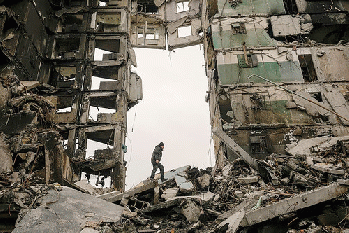Should a human rights organisation apologise for publishing important evidence of war crimes and human rights abuses?
If it does apologise, what does that suggest about its commitment to dispassionately uncovering the truth about the actions of both parties to war?
And equally, what message does it send to those who claim to be "distressed" by the publication of such evidence?
Those are questions Amnesty International should have pondered far more carefully than it obviously did before issuing an apology last week over its latest report on the war in Ukraine.
In that report, Amnesty accused Ukrainian forces of committing war crimes by stationing troops and artillery in or near schools, hospitals, and residential buildings, thereby using civilians effectively as human shields.
Such practices by Ukrainian soldiers were identified in 19 different towns and villages.
These incidents did not just theoretically endanger civilians. There is evidence, according to Amnesty, that return fire by Russian troops on these Ukrainian positions led to non-combatants being killed.
The Israeli army regularly accuses Palestinian factions like Hamas of hiding among civilians in Gaza, while obscuring its own, long-documented practice of using Palestinians as human shields.
But whatever the truth of Israel's claims, unlike the tiny and massively overcrowded Gaza, which offers few or no hiding places outside of built-up areas for Palestinian fighters to resist Israeli aggression, Amnesty concluded of the situation in Ukraine: "Viable alternatives were available that would not endanger civilians, such as military bases, or densely wooded areas nearby, or other structures, further away from residential areas."
In other words, it was a choice made by the Ukrainian army to put its own civilians in harm's way.
Mounting pressureNotably, this is the first time a major western human rights organisation has publicly scrutinised the behaviour of Ukraine's soldiers. Until now, these watchdog bodies have focused exclusively on reports of crimes committed by Russian forces - a position entirely in line with the priorities of their own governments. By its own admission, Amnesty has published dozens of reports condemning Russia.
The pushback against the latest report was relentless, coming even from Amnesty's own Ukrainian team. Oksana Pokalchuk, its head, quit, explaining that her team "did everything they could to prevent this material from being published".
Under mounting pressure, Amnesty made a statement last week in which it said it "deeply regrets the distress and anger" caused by its report, while at the same time stating: "We fully stand by our findings."
The idea that only one side has been committing war crimes in Ukraine was always implausible. In wars, all sides commit crimes. It is in the nature of wars.
(Note: You can view every article as one long page if you sign up as an Advocate Member, or higher).






